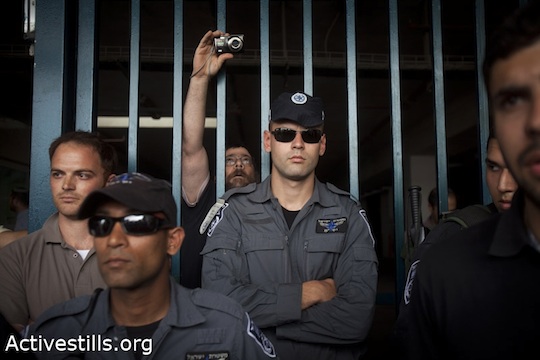When Israeli civilians try to kidnap a Palestinian child, the police do their best not to investigate.
By Yesh Din, written by Yossi Gurvitz
The date: December 19, 2014. The place: the AM/PM convenience store outside the West Bank village of Hawara. Majed Musa AbdAziz As’ous parks his vehicle across the road from the store, making certain the windows are open, and goes in for a quick purchase. In the front seat on his right sits five-and-a-half year old N.; two other children sit in the back seat.
As the father crosses the road, an Israeli vehicle — As’ous would later remember it being a red Subaru Justy, along with a few numbers from the license plate – with four young, Israeli men swerves into the scene. The Subaru parks near As’ous, with its back window adjacent to the windshield of As’ous’ car. The Israeli in the back seat of the Subaru leans across the window, seizes N., and tries to pull him into the Israeli vehicle.
Hearing N.’s terrified screams, As’ous runs back. He manages to see the Israeli vehicle escaping, only to catch a glimpse of the man who almost kidnapped his son. As’ous lodges a complaint with the Palestinian police the following day, which transfer it to the Israeli District Coordination Offices (DCO).
In February 2015, two months after the incident, the complaint makes it to the Israeli police, which then pretend to investigate the case. They take As’ous’ testimony, who tells the cops he knows of another witness whom he can locate. In a second interview four days later, police investigator A.A. asks As’ous whether there are security cameras in the area — he says he thinks there are.
At this point, a reasonable man would assume A.A. would turn to the AM/PM shift manager, identify himself as a policeman, and ask for the relevant tapes. A.A. assumed that the chance that there is little chance these tapes exist (personally, I believe that his assumption was sound — too much time had indeed passed). Furthermore, wrote A.A. in a memo, it is not at all likely that the cameras actually covered the road area; from his rich experience, he believes they mainly cover the cash registers. Thus, A.A. decided not to look into the issue at all.
Rewind, slow motion: the crime – the attempted kidnapping of a child; the response of investigator A.A. — not to bother to even check whether evidence exists, or whether the cameras cover the road. He just assumes they don’t and closes the case under the ever-popular “unknown perpetrator clause.”
Perhaps the cameras caught what had happened; perhaps they didn’t. Perhaps they did, but too much time had passed and the tapes were deleted. Or maybe, due to the whole mess of the kidnapping, the owners decided to keep the tapes for evidence. We’ll never know, because A.A. never bothered checking. He preferred to guess.
But the negligence doesn’t end here. Leaving the tapes aside – the chance they still existed was indeed low – there were other, stronger leads. As’ous gave A.A. a fairly accurate description of the Israeli vehicle — but A.A. didn’t bother to cross that information with similar vehicles registered in the nearby outposts and settlements.
As’ous told him he knows of another witness — the police didn’t bother to summon him or take his statement. It’s just a Palestinian child, after all. As’ous says he thinks he may be able to identify the kidnapper — but A.A., the Samaria and Judea Police Department’s Sherlock Holmes, do not bother to ask him to look at the police felon photo book. In fact, A.A. doesn’t take any investigative action whatsoever; the entire case file is three pages long. When it comes to excuses, however, he’s a master.
All this information comes to us directly from the investigative files. Recently, Yesh Din attorneys Noa Amrami and Michal Pasovsky appealed the decision to close the case. Their demands are simple: carry out the aforementioned, minimalistic investigative actions, so that the life of a Palestinian child won’t be deemed negligible.
It’s important to remember these days, when the SJPD and the Shin Bet tell you they’re doing everything they can to stop Jewish terrorists, that “all we can do” looks all too often like A.A.
Written by Yossi Gurvitz in his capacity as a blogger for Yesh Din, Volunteers for Human Rights. A version of this post was first published on Yesh Din’s blog.


